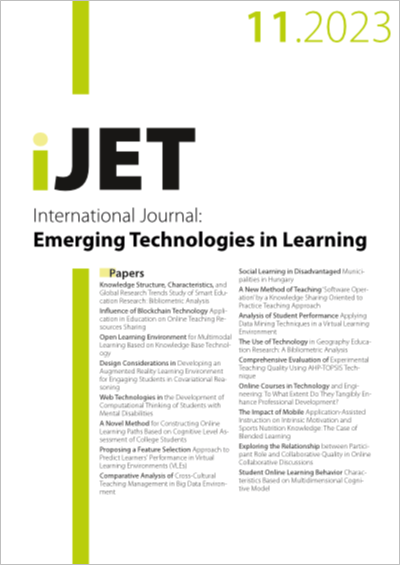Exploring the Relationship between Participant Role and Collaborative Quality in Online Collaborative Discussions
DOI:
https://doi.org/10.3991/ijet.v18i11.38699Keywords:
online collaborative discussion, role analysis, emerging role, clustering analysisAbstract
The exploration of the role concept has become an important perspective for analyzing and promoting computer-supported collaborative learning (CSCL). Understanding the relationships between individual participation roles and collaborative performance is of great significance to the research of collaborative learning theory, pedagogy and technology. However, few empirical studies investigated the individual participation roles in collaborative discussions and the impact of participation role configuration on group performance. Based on the interactive content of learners in collaborative discussions, this research uses machine learning methods to automatically identify learners’ participating roles. Through cluster analysis, five different roles are identified: leader, problem solver, coordinator, marginal learners and learners with difficulties. Furthermore, this research explores the relationships between individual participation roles and group collaboration quality. The results show that groups with different collaboration performances have different role compositions, and the roles of leader, problem solver and coordinator have significant positive effects on collaboration performance. Learners with difficulties have a negative impact on collaboration performance. Combining the research results with the discussion content of the learners, this research conducted an in-depth discussion and analysis of the characteristics of each role, and proposed implications for teaching guidance and researchers.
Downloads
Published
How to Cite
Issue
Section
License
Copyright (c) 2023 Huichao Mi, Qiaorong Zhang, Yafeng Zheng

This work is licensed under a Creative Commons Attribution 4.0 International License.


